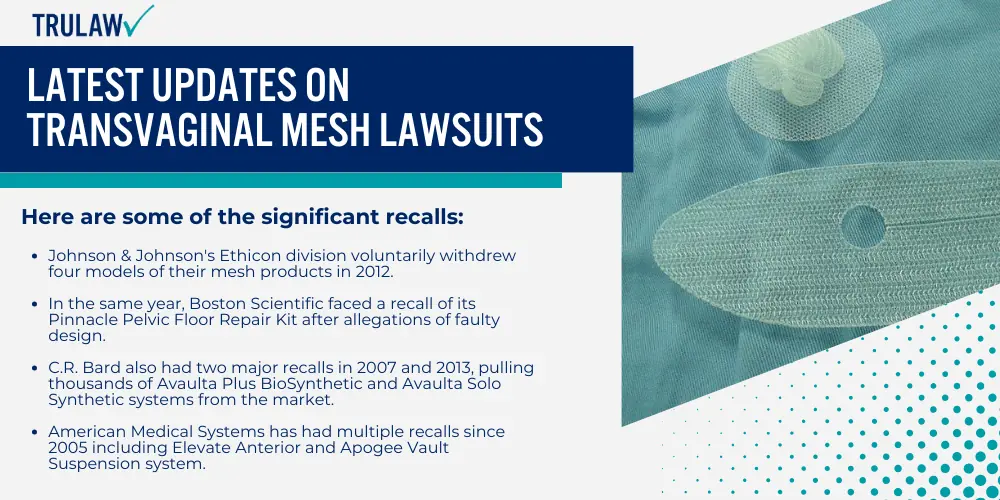This section delves into the details of transvaginal mesh implants, discussing what they are, their safety considerations, and potential complications that may arise from their use.

What is Transvaginal Mesh?
Transvaginal mesh is a net-like implant made of synthetic material that doctors use in surgical procedures to treat conditions such as stress urinary incontinence (SUI) and pelvic organ prolapse (POP).
Surgeons insert it through the vaginal wall, providing support to weakened or damaged tissues.
Transvaginal mesh procedures can sometimes be referred to as tape, sling, ribbon, surgical mesh devices, or pelvic mesh.
Its primary function is to hold up pelvic organs, like the bladder or uterus, that have slipped out of place due to childbirth, surgery, or age.
Are Transvaginal Mesh Implants Safe?
The safety of transvaginal mesh implants has sparked much debate. The U.S. Food and Drug Administration (FDA) has classified complications from these devices as “not rare.”
This perspective contrasts significantly with the initial perception of these medical products, which doctors viewed as a revolutionary treatment for conditions such as pelvic organ prolapse.
Numerous adverse reports have surfaced over time, placing the safety of these implants under intense scrutiny.
One common complication is vaginal tissue erosion, making abdominal surgeries using similar mesh materials a safer alternative.
Chronic pelvic pain also plagues many patients who have undergone procedures involving transvaginal mesh implants.
As a result of excruciating pain, professionals are feverishly seeking other therapeutic solutions to address health concerns previously treated with this controversial device.
Vaginal Mesh Complications
Mesh implants are not without their own set of risks.
The complications can vary in severity and frequency, but some are common across most patients.
More often than not, women with transvaginal mesh implants report pain during intercourse or while going about normal activities.
In rare but serious cases, the mesh can actually erode the vaginal tissue leading to infection and other health issues such as vaginal scarring.
Another potential complication is organ perforation where the sharp edges of the mesh cut into organs surrounding tissue, like bladder, bowel or blood vessels around it.
Bleeding caused by such perforations could lead to severe consequences if left untreated.
Other reports include recurrent pelvic organ prolapse (where organs fall down or slip out of place) and urinary problems following the transvaginal repair surgery.
Transvaginal Mesh Attorneys navigate these complexities to file lawsuits alleging such medical deficiencies for their clients.







